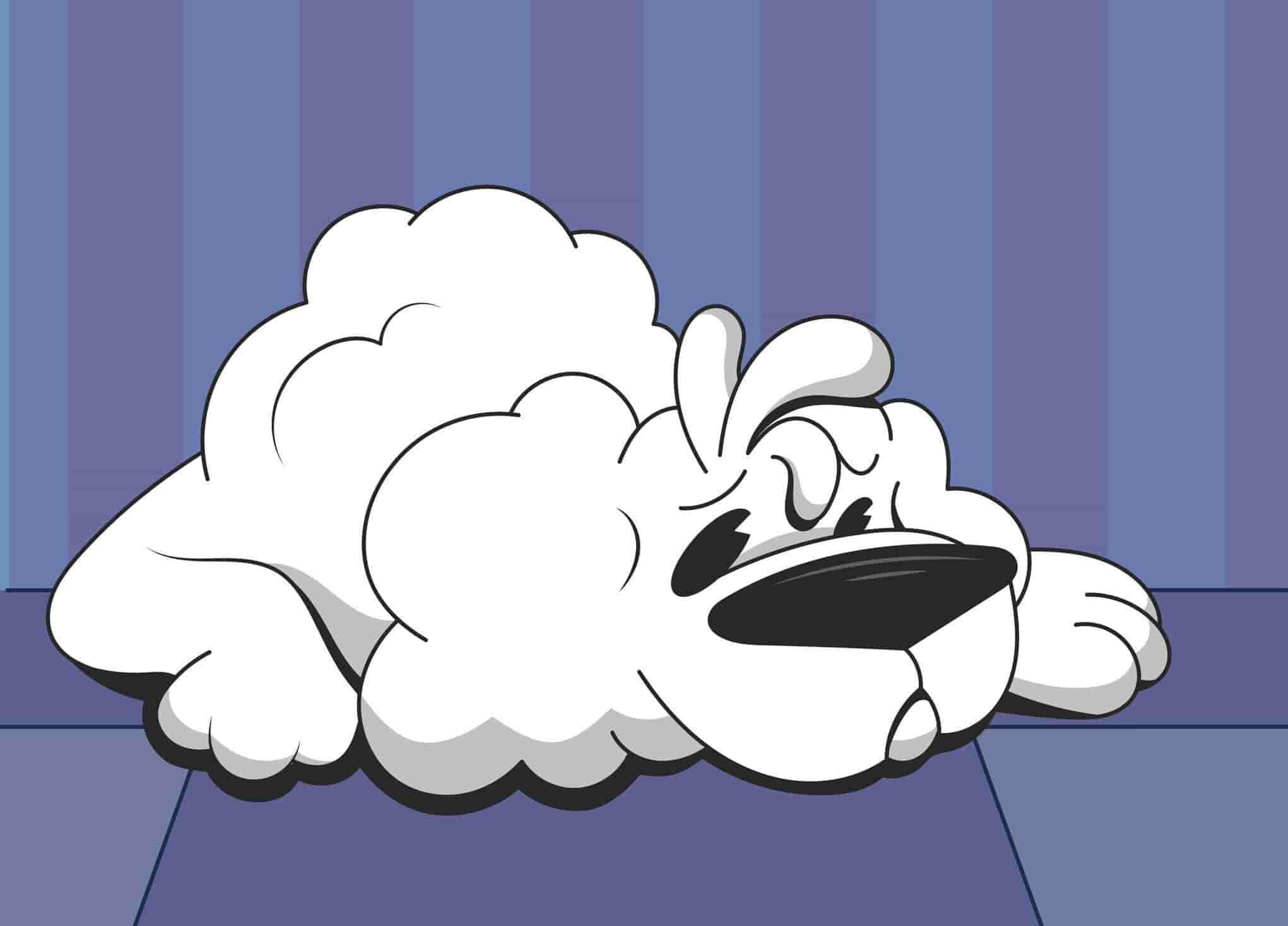Dog owners are taught to believe that a wet-nosed dog is a happy dog, and a dry-nosed dog is one that is either unhappy or unwell, but that’s not always the case. For some breeds, it is perfectly normal to have a drier-than-usual dog nose; but in other cases, the symptom could be one of a more significant medical condition.
But how do you know the difference?
Let’s take a closer look at what causes dry nose in dogs, how to treat it, and when you should think about it as a cause for concern.
This article was reviewed by our expert veterinarian, Chris Vanderhoof (DMV).
Stop Googling - Ask a Real Vet
Are dogs supposed to have wet noses?
Yes, dogs are supposed to have wet noses – but that doesn’t necessarily mean that a dry nose, also known by its proper or medical name: hyperkeratosis, is a massive cause for concern.
Wet noses detect and analyze scents better than dry noses do, and that’s why dogs sniff a lot. They’ll sniff home visitors to make sure that they don’t smell of anything ‘bad’, and they’ll sniff other dogs to get a sense of who they are, and whether they’re a friend or foe. In fact, along with licking (taste), dogs will sniff pretty much everything and anything. It’s how they get to know the world around them.
Dry noses do not detect or analyze scents as well as wet or moist noses do.
Note from Dr. Vanderhoof: This is mostly because scent particles can't adhere to dry noses as well as they can to moist ones.
Not only do dogs use their noses to analyze the world around them, they also use it to sweat and regulate body temperature, along with their paws.
Why is my dog's nose dry?
Certain dog breeds are actually more prone to suffering from dry nose and similar symptoms or conditions than others. These are the flat-nosed breeds, also known as brachycephalic breeds.
These include:
- Pugs;
- Boxers;
- Bulldogs.
Certain breeds are also known to struggle with nose-licking, either because the tongue isn't quite long enough, or the snout is too pronounced or long, or both. These include:
- Shitzus;
- Chihuahuas.
That's not to say that all of those doggy breeds will have crusty or dry noses all of the time, but they do tend to suffer more than other breeds. It is something you will need to bear in mind when choosing to buy, adopt or rescue those specific breeds, as they will often come hand-in-hand with costly vet bills and healthcare. (I have a bulldog brother and can most definitely attest to this.)
As well as certain dog breeds, older dogs of all breeds seem to suffer from dry noses more frequently than their younger counterparts.
What does a dry dog nose mean?
If your pampered pooch has a dry nose, it could be due to a number of reasons. The most common and benign of which is simply that your furry friend hasn't been licking their nose frequently enough to keep it moist. This happens a lot when dogs are asleep.
According to research, hot weather can also cause dry dog nose, and this is definitely the case if your dog hasn't been drinking enough water. If the temperature is very hot outside, you should make sure that your dog has access to fresh, clean drinking water at all times. A dry mouth will definitely lead to a dry dog nose.
Cold weather can also cause a crusty and dry dog nose because home heating is usually turned on. If your pooch loves to lie in front of the fire and soak up the warmth, it is inevitable that their nose will dry out. The same can be said if you have heating air vents or central heating. In the same way that they can dry out human skin, hair, throat, and mouth, it can also dry out a dog's mouth and, in turn, a dog's nose.
Causes for concern
Although a dry nose is relatively normal in some cases (albeit probably rather unpleasant for the dog), there are occasions where it is a symptom of something a little more serious and potentially damaging.
Is your furry friend displaying other symptoms?
You should contact a vet if your dog has a dry nose and is also showing any of the following:
- No interest in food;
- Panting a lot;
- Diarrhea;
- Vomiting;
- Fatigue and lethargy;
- Changes to the eyes;
- Dry mouth;
- Thick and sticky saliva.
Those are common symptoms of dehydration in dogs, which is a common reason why dogs get a dry nose. Dehydration can be a medical condition all of its own, but it can also be a sign of something bigger and more problematic. This includes heat stroke, food poisoning, a fever (due to other health conditions, such as infection), diabetes, problems with the kidneys, cancer, and more.
Read more: Beat the Heat: How to Keep Your Pet Cool This Summer
If you can’t constantly or consistently monitor your dog for other potential symptoms, it might be worth investing in Petcube’s interactive pet camera. You can check in with your pet whenever you have a free moment, as well as watch footage, giving you a better overview of your pet’s health and well-being.
If you spot a crusty dry dog nose, or it’s sore-looking and/or split, it is a good idea to be mildly concerned – but this is more to do with the well-being and comfort of your pet than anything else. There’s a chance that your dog’s dry nose is also painful and sore.
What is the best dog dry nose treatment?
The best kind of treatment for your pampered pooch is the one that targets the specific cause of your dog’s dry nose. If the cause is dehydration, rehydrating the pooch will soon resolve the problem. If the symptom has been caused by something else, however, rehydrating your dog – alone – will not help.
How to treat dry dog nose at home
If you believe that your dog’s dry nose is caused by hot weather, a mild case of dehydration, or something else that can be easily cured without medical or veterinary intervention, you should ensure that your dog has a fresh supply of clean drinking water. If necessary, place multiple bowls of water in locations that your dog would usually frequent.
You can also look at moisturizing your dog’s nose with a dog-friendly, safe-to-eat balm – but you must make sure that it is designed for dogs, and your breed of dog specifically (in some cases) before administering it. The dog will lick the balm from their nose and ingest some of it.
How to cure dry nose on a dog: the vet version
If your dog’s dry nose problems require medical intervention, that is what your vet will provide – but only when absolutely necessary.
If your dog has a relatively severe case of dehydration, they may need to be held at the vet’s overnight, for monitoring, fluids, and other potential treatments or medications.
If the dehydration is caused by something, such as a fever, diagnostic tests will need to be performed to get to the root cause, which can then be treated. If the dry nose and dehydration are caused by a fever because of an infection, for example, antibiotics might be necessary.
If your dog has a more serious problem causing the dry nose problem, the right and appropriate treatment will be given for that condition. Lupus and other autoimmune diseases in dogs are often treated with various combined therapies and treatment courses.
Concerned about vet costs?
It doesn’t take long before vet bills mount up, and if you’re not prepared for it, with the money in the bank to pay for it, the situation can get a whole load more stressful. There’s good news on the horizon, though: Petcube’s Emergency Vet Fund is designed to help you pick up the pieces when your pampered pooch needs vet care.
For as little as $1 per day, you can get access to around-the-clock specialist vet care, up to the value of $3,000, for when you need it the most – and that’s $3,000 each, for up to 6 pets!
FAQ
Is Dry Nose on a Dog Bad?
No, a dry nose on a dog is not always bad. Sometimes it is a perfectly natural response, like when the dog has been sleeping and has not been licking their mouth and nose. Sometimes, however, a dry nose skin can be a sign of something more serious, that potentially needs medical intervention. If you are not sure, it is always better to have your pup checked over by a vet.
What Does Dry Dog Nose Mean?
A dry dog nose can be an indication of a number of things, including dehydration, old age, dry eye, allergies, and sunburn as well as more serious conditions such as lupus, pemphigus, and other autoimmune conditions. If you can’t be sure that the dry nose has been caused by a sleeping pooch, or because the dog is slightly dehydrated and is soon-to-be rehydrated, it is best to get the symptom checked out by a vet.

Was this article helpful?
Help us make our articles even better









